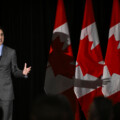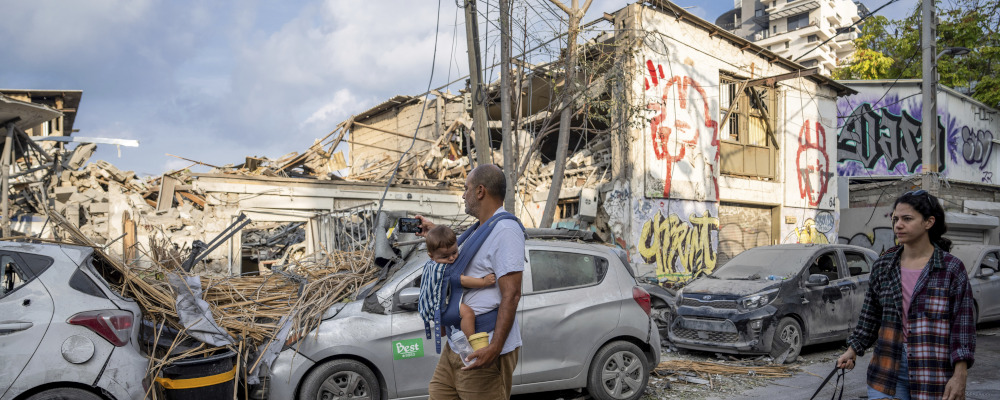Israel announced a “total blockade” of the Gaza Strip in response to the devastating surprise attack by Hamas on the weekend that left more than 1,200 Israeli civilians dead.
Prime Minister Justin Trudeau and other world leaders condemned the attacks and Israel has launched a retaliatory assault that aimed to root out Hamas and its infrastructure from Gaza.
Here at The Hub, we’ve assembled our contributors for their instant reactions to the ongoing conflict and their best analysis on what happens next.
CUPE chooses Hamas over workers
By Rahim Mohamed
As the first horrifying images from Hamas’ pogrom in southern Israel surfaced on Friday, CUPE Local 3906, a union representing more than 3,000 academic workers at McMaster University, tweeted: “Palestine is rising, long live the resistance ” The tweet was later deleted, but not before a meme pairing these words with an image of half-naked female hostage (identified as German national Shani Louk) lying prone in the back of a Hamas pick-up truck made its rounds on social media. (As of Tuesday afternoon, no retraction has been issued).
” The tweet was later deleted, but not before a meme pairing these words with an image of half-naked female hostage (identified as German national Shani Louk) lying prone in the back of a Hamas pick-up truck made its rounds on social media. (As of Tuesday afternoon, no retraction has been issued).
It would soon become clear that this sentiment was shared widely within the organization, extending all the way to its leadership. CUPE Ontario President Fred Hahn himself unleashed a torrent of incendiary tweets targeting Israel over the long weekend, perhaps most egregiously using the pro-Palestinian #resistance hashtag twice in a Thanksgiving message to his 11,300 followers on X. A belated and half-hearted statement issued by CUPE National on Tuesday did nothing to reverse this perception.
This, to put it mildly, is not a great look for an organization that over 700,000 workers are counting on to fight for their best interests. As The Hub‘s Trevor Tombe has noted, the return of inflation has made collective bargaining an especially high-stakes game, with workers relying on CUPE and other major unions to deliver substantial wage and benefit hikes. It will be of paramount importance, in the months to come, for labour unions to maintain a favourable image with the Canadian public—the recent social media outbursts may well come back to haunt CUPE at the bargaining table.
Fred Hahn and other CUPE leaders have done a disservice to the organization’s members by needlessly taking sides in a foreign conflict.
Israel’s tragedy is ours, too
By Sean Speer
Among the insights in Adam Smith’s 1759 book, The Theory of Moral Sentiments, is that human nature limits our ability to empathize with the pain and suffering of strangers far away from us—especially in comparison to threats to our own health and well-being. In particular, he compares our hypothetical reaction to an earthquake in China and the prospect of losing our little finger. As he put it:
The most frivolous disaster which could befall himself would occasion a more real disturbance. If he was to lose his little finger to-morrow, he would not sleep to-night; but, provided he never saw them [the earthquake victims], he will snore with the most profound security over the ruin of a hundred millions of his brethren, and the destruction of that immense multitude seems plainly an
object less interesting to him, than this paltry misfortune of his own.
Although I’m reluctant to disagree with the father of economics, his judgment here failed in hindsight to account for two factors: (1) technology that makes it impossible not to “see them” and (2) parenthood.
Recent days have forced everyone around the world to confront the images of Hamas’ barbarity. Its murders, rapes, and other violence have been broadcast live via social media. Hamas terrorists have often themselves been the ones broadcasting it. There’s been no option therefore to snore away in our own security. We’ve been forced to watch the brutal reality in horror.
Smith who himself was childless also underestimated the empathy that one derives from the shared responsibility of parenthood. The stories of parents who were killed trying to protect their kids or of babies and children who have been brutally murdered are enough to overwhelm any parent. Our minds instinctively go to our own children and the unbearable thought of us and them in such awful circumstances. The face of an innocent child closes great distance.
The events of recent days in short have unproven Smith’s theory. Israel’s tragic misfortune is not its alone. We’ve felt their pain and suffering. And we’ll not forget.
A refugee crisis is brewing
By Amal Attar-Guzman
Hamas’ invasion of Israel has been a global shock. At least 1000 people have been killed by Hamas and 150 people have been taken hostage, including IDF army officers and the elderly, women, and children. Sexual violence has been reported and there are videos of the desecration of the dead circulating on social media.
In response, Israel declared war on Hamas and launched waves of airstrikes, and is preparing a ground-operation into Gaza. So far, at least 830 have been killed and 4,250 have been injured.
The numbers of those killed and injured will only rise for days to come.
In the last few days, there has been a lot of talk about geopolitical strategy, such as, how will this conflict impact the region? Is Iran involved? How does Russia and China benefit? How did Israeli and allies’ security apparatuses fail to predict Hamas’ attack? How will neighbouring Arab nations respond?
While we can come up with many theories of how the war will play out, there is one irrefutable fact no one can deny: a refugee crisis is about to explode.
Israel’s citizens have been killed, taken hostage, or missing. Many evacuated from their towns and communities near the Palestinian border. Fears of further Hamas’ attacks are still alive and well and ongoing internal displacement will cause further stresses in the country. While many Israeli reservists abroad are trying to go back and fight, if the Israeli government does not retrieve hostages or improve the situation quickly, it would not be surprising for Israelis and their families to contemplate leaving the country to find a safe haven elsewhere.
Gaza and the West Bank are extremely dense and have poor infrastructure and resources. Hence, specifically in Gaza’s case, despite airstrike warnings from Israel, Palestinians are having a tough time finding safe haven within Gaza and many will likely die as a result. It will not be surprising that some will flee and head towards neighbouring countries such as Jordan, Syria, or Lebanon for safety. The creation of new refugee camps or joining already overrun refugee camps will only cause further security and socio-economic stresses in the region.
Canada will need to be ready for this reality. Despite current domestic challenges, it will not be surprising to hear calls from the Israeli and Palestinian diasporas to take in refugees from their respective communities as the conflict rages on. Canada will need to prepare on how to deal with this and strictly walk the line to ensure that their actions do not further inflame already deeply-wounded grievances in either community.
Morally critiquing the Hamas attacks on Israel
By Karamveer Lalh
When I was sitting around the Thanksgiving table with my family this weekend, my mind immediately turned to the horrible attacks on Israel by Hamas. The petty political bickering we have in Canada seems small in comparison to the real violence and real fear those in Israel and, indeed, the Jewish community broadly must be feeling. Speaking only on domestic issues here, over the course of the weekend, a few things in particular stood out to me.
Following along on social media, I found it concerning that there appeared to be an instinct among many prominent people to either equivocate or even support the bad things they saw or read about. The instinctive idea to place bad actions within a broader intersectional context, while likely rooted in the noblest of intentions, degrades our ability to form moral judgments.
Without the ability to form moral judgments, we become disconnected from our ability to define bad acts as bad acts and instead focus on the actor or the actor’s identity instead of the act itself. This is a pervasive trend in all aspects of our political life. I would like to see conversations about whether this is indeed the correct way to orient ourselves, particularly in a judicial and political context.
Even a casual familiarity with history will tell you that many evils have been conducted in the name of revenge. Israel is justified in wanting to eliminate the threat of Hamas but that does not mean that the collateral that they will inevitably incur as a result of that is at all good.
Domestically, people are rightfully angered at what they see as their fellow Canadians marching in support of terrorist groups. I suggest that the correct way to respond to those actions is to march with the counterprotests and remind everyone that freedom of expression, with a bright line exception of inciting violence, is a fundamental political right.

There is no tranquility when one group wants the other exterminated
By Brian Dijkema
While Hamas does not have the same strength as the Nazis during WW2, there is, nonetheless a moral analogy: they wish the Jewish people to be exterminated; they intentionally, deliberately, and willfully, target non-combatants; they torture and humiliate Jewish people. They kill indiscriminately. They desecrate the dead.
No amount of whataboutism justifies this. It is unadulterated evil. That Hamas rejoices in this evil only makes their actions more heinous. It is completely inexcusable and Israel is justified in responding with arms and with force.
I care a great deal about peace. Peace is, as one of our theologians says, “more than the absence of war. It is the tranquility of order.” There can be no tranquility when one group wants the other exterminated. There can be no order, nor tranquility, when one side kidnaps children, and elderly people, even Holocaust victims. How can there be peace in such conditions? The Jewish people—Israelis of all sorts—cannot live in tranquility when such things can happen out of the blue. I repeat: the state of Israel is justified in responding with arms to such actions by Hamas.
The moral conditions of just war theory note that just wars can be conducted unjustly. It’s possible Israel will violate principles of jus in bello; it’s fine to critique that. But that does not negate the jus ad bellum. Those who call out for jus in bello without condemning Hamas are engaging in moral equivocation. It’s wrong.
There is a path to peace, but it must begin with Hamas recognizing Israel and putting down arms. Successful movements for political recognition have, in the past, done this: Gandhi, MLK Jr. Peace must be begun by peace; even if you believe you are weaker; even if you are ill-treated. There is a path. But this is the only one that can lead to durable peace. As our Cardus paper shows, Jewish people are the primary target for religiously motivated hate crimes. It’s not even close. They are targeted more than all other groups combined.
The importance of our common humanity
By Kelden Formosa
Anti-colonialism was the theme of many of the tweets and statements justifying the rape and murder of Israeli civilians this weekend. Ordinary Israelis living within the 1967 borders were called “settlers,” even if they were born and lived their whole lives in the same place, and their “settler” status is what made them a legitimate target of attack. Even children were seen as guilty.
Looking out at my beautifully diverse class of six- and seven-year-olds, I thought today of how important it is that I teach my students to see each other first and foremost as fellow human beings, each one unique but all endowed with the same dignity and worth.
They are not “settlers” or avatars of a particular race or religion. In an education system that increasingly wants children to think of themselves that way—or worse, as oppressors or oppressed—I want my students to learn first their common humanity. All other problems are easier to fix when our children are taught to see their classmates as brothers and sisters in the human family, not inheritors of historic grievances and ancient hatreds.
Recommended for You

The Notebook by Theo Argitis: Carney’s One Big Beautiful Tax Cut, and fresh budget lessons from the U.K.

Ginny Roth: How vacant liberal nationalism left Canada worse off than George Grant even imagined

Peter Menzies: Justin Trudeau’s legislative legacy is still haunting the Liberals

‘Our role is to ask uncomfortable questions’: The Full Press on why transgender issues are the third rail of Canadian journalism



